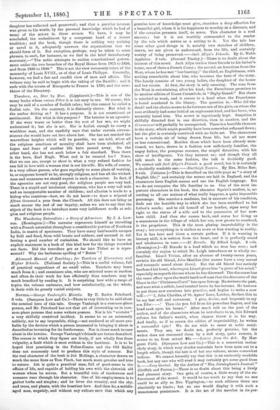Theodora, or, Star by Star. (Lippincott.)—This is one of the
many books whose raison d'être it is not easy to see. Of course, this may be said of a number of foolish tales ; but this cannot be called a foolish tale. On the contrary, it is distinctly clever. But what is the author driving at ? It has a purpose. It is not sensational or sentimental. But what is this purpose ? The heroine is an agnostic. If she were worse or better than the rest of her sex, we might understand it ; but she is not. She is foolish enough to marry a worthless man, and she candidly says that under certain circum- stances she would have set love above law. She has not reached the marvellous heights which will be possible, we are told, when all the religious sanctions of morality shall have been abolished, all hopes and fears of another life have passed away. On the other hand, she has not sank below a fair standard. Then there is the hero, Earl Hugh. What end is he created for ? None, that we can see, except to show in what a very refined fashion he can fall in love with a woman that is not his wife. His wife, of coarse, is a very odious person, who goes regularly to some place of worship, is, or supposes herself to be, strongly religious, and has all the wicked- ness and meanness we should expect in such a character. In fact, if the agnostics are not very good, the religious people are very bad. There is a stupid and intolerant clergyman, who has a very tall wife and an insupportable number of children ; and allusion is made to a bishop who contrives—how, we do not know—to draw a stipend of fifteen thousand a year from the Church. All this does not bring us much nearer the end of our inquiry, unless we are to say that the abject of the book is to introduce some very indifferent scoffs at reli- gion and religions people.


































 Previous page
Previous page